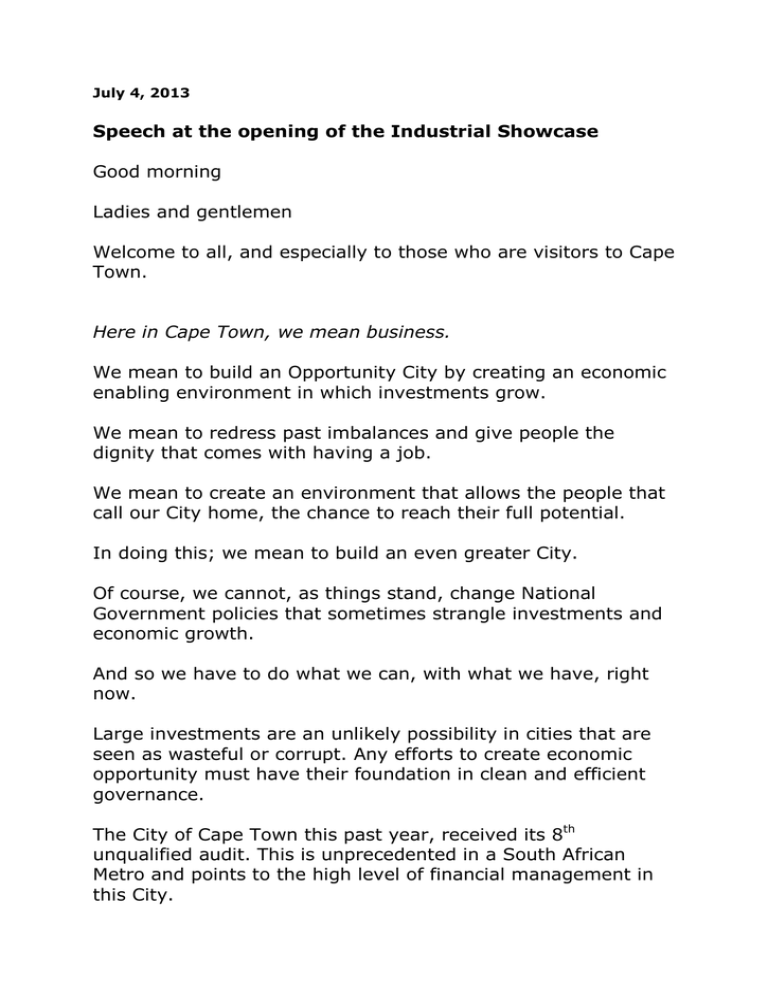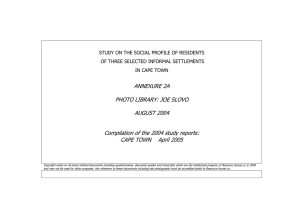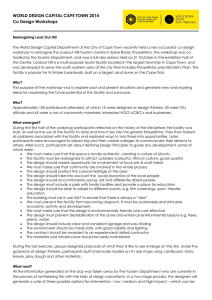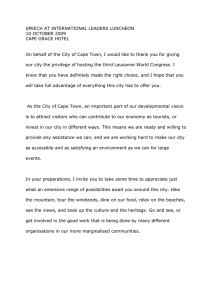Speech at the opening of the Industrial Showcase Good morning
advertisement

July 4, 2013 Speech at the opening of the Industrial Showcase Good morning Ladies and gentlemen Welcome to all, and especially to those who are visitors to Cape Town. Here in Cape Town, we mean business. We mean to build an Opportunity City by creating an economic enabling environment in which investments grow. We mean to redress past imbalances and give people the dignity that comes with having a job. We mean to create an environment that allows the people that call our City home, the chance to reach their full potential. In doing this; we mean to build an even greater City. Of course, we cannot, as things stand, change National Government policies that sometimes strangle investments and economic growth. And so we have to do what we can, with what we have, right now. Large investments are an unlikely possibility in cities that are seen as wasteful or corrupt. Any efforts to create economic opportunity must have their foundation in clean and efficient governance. The City of Cape Town this past year, received its 8th unqualified audit. This is unprecedented in a South African Metro and points to the high level of financial management in this City. 2 This sound financial management helps us to ensure that the lights remain on and the water is running – something that is essential to creating and growing business. So, why should business want to come on board with us – as we set about making this great City, even greater? Well, we have gone to great lengths to find out what spurs business on and what frustrates it – and are working hard to respond to these findings. We have an approach to building a platform for economic growth, of which the key legs are infrastructure, efficient regulation and working institutions. Over the past five years, the City has invested R20 billion in infrastructure, focussed most heavily on that required for economic growth – electricity distribution, water, sanitation, waste disposal, roads and public transport. We have learnt that red tape, and the delays that this brings, is a major deterrent to investors who want to get ‘stuck right in’ to the projects they have invested in without having to be shafted from pillar to post by the municipality. Whether it be acquiring a business licence or acquiring business premises and the associated applications for zoning, approval of building plans and compliance with OHS standards, getting all the I’s dotted and t’s crossed can be a real pain in the proverbial! And so, as any good municipality that is open for business should do, we have put in place a number of initiatives to streamline the process for potential investors. These red tape reforms include a combination of small simple changes to the process and longer-term strategic reforms. 3 We have collapsed 27 old and complicated zoning schemes into one single, modernised scheme, with simplified and consistent rules across the entire metro. So where once you and your planning or legal departments might have had to contend with 1507 pages of regulations, we’ve trimmed it down to 185. The City of Cape Town is currently in the process of drafting a new Municipal Planning By-law. One of the principles adhered to in the drafting of this law is that procedures must be streamlined and red tape minimised. This by-law will aim to improve enforcement mechanisms and to resolve issues relating to the imposition of development contributions. The City is looking at ways to speed up applications whilst at the same time ensuring that everyone has a reasonable opportunity to influence the process. The City’s Spatial Development Framework has been approved. With the approval of the Cape Town SDF, property developers will no longer need to apply for time-consuming ‘Guide Plan’ amendments. They will be able to make better investment decisions as the Cape Town SDF indicates very clearly where urban development should take place and where it should not. It also proposes a phasing of development that will support the efficient roll-out of infrastructure, services and social facilities. There are a number of policies which have been developed or reviewed to ensure that decision making is adequately supported: Some examples include the Urbanisation policy, the densification policy, tall buildings, sky bridges, pedestrian bridges, Outdoor Advertising Policy, Informal Trading Policy, Incentives Policy, SME Business Support Policy. As you can see they range from large scale to the very specific – but each are important in guiding how quickly and efficiently applications can be processed. We are currently developing an electronic plan approval system. Electronic plan passing and permitting forms an 4 important part of this drive towards greater efficiency in the City’s regulatory processes. An electronic application system will yield many efficiency benefits. Applications will be able to be sent to various departments simultaneously instead of the current linear system which will speed up turnaround time considerably. Also, applicants will be able to track their applications online. A fully electronic system which includes all relevant departments will allow for bottlenecks to be better managed. Currently, it is difficult to assess where an application is being held up, as applications are passing through a range of departments. An online system will have an in built tracking system which will allow for the monitoring of performance by a department. Another, already operational, initiative of our ‘red tape to red carpet’ approach is the Integrated Spatial Information System. This is an integrated property data management system that allows the City to better manage the transactions relating to the various properties located within the municipal area. ISIS integrates the City's property information and property records management systems into one system, in order to improve the reliability of property data and streamline the different systems which were previously used to capture, store, maintain, disseminate and manage information about all properties in Cape Town. Part of the data clean-up in this system enabled us to reduce the number of accounts posted from 1.6 million per month to just under 1 million per month. Our e-portal is operational and customers can choose to have their bills emailed to them and register to access their billing history. The City is also engaged in the development and implementation of overarching strategies and policies to promote and facilitate major and strategic projects. The City has a Development Facilitation Unit which facilitates and coordinates major projects. 5 This Unit promotes major developments on Council-owned land and markets and promotes the City as a desirable investment location for property development projects in partnership with the private sector. Whilst creating an environment that encourages investors to the City is important, we believe it is equally important to support entrepreneurs as much as we are able. In doing so, we contribute to making someone’s business dreams come true, encourage the creation of jobs now, and support our big investors of the future! The City of Cape Town hosts the Telkom Entrepreneurial week annually during which start-ups can network and get guidance on the challenges they face. The City has also ensured that in all our libraries, free internet access is available so that young entrepreneurs can be competitive in this digital, fast-paced business climate we are in. In the longer term, Cape Town and the Western Cape Government have various programmes in place to ensure better access to Information and Communications Technology. In addition to facilitating the private sector networks, the City has in the process of rolling out a city-owned fibre network. The complete Broadband infrastructure project has a projected cost of R1.2 billion. To-date, some 300 km of fibre are operational. The installed network covers our city core business zone from Green Point to Bellville, and also extends from Atlantis to Khayelitsha and Mitchells Plain. Investment in broadband infrastructure will help drive economic development, especially in previously disadvantaged areas. The City is in discussion with a range of private ISPs and businesses to provide services to the public over the city network. We are investigating a Wi-Fi mesh network for Mitchells Plain and Khayelitsha and hope to have that operational within a year. 6 The Cape Town Activa initiative, which is supported by the City, promotes a multi-stakeholder network which will make it easy for entrepreneurs and individuals seeking employment support to navigate and make use of the services and access resources from public and private support organizations while also bridging the gaps in service provision. In this regard work is well advanced on our interactive Portal which will not only provide a central source of information, self-help tools, integrated events, competitions and training calendar, and so forth but also on concluding shared service agreements to establish contact points and programmes across the City with partner organisations such as The Business Place Philippi and the Raymond Ackerman Academy. We know that to be a City that is truly open for business, efficient and affordable public transport is essential in order for people to access the economic opportunities that you create for them. Cape Town is a sprawling city, with low densities, which do not always support efficient public transport. The city has adopted a policy of densification and has implemented a system of dedicated bus lanes. In addition, it is in the process of establishing its own Transport Authority. This authority will manage an efficient and effective public transport network with a “one ticket, one public transport network” motto; a first for South Africa. Various routes have been added to the MyCiti bus routes, and the services from Atlantis and Mamre to the City centre will be operational soon, with feeder services within Atlantis and Table View. There are local feeder services within the City Bowl area, extending as far as Salt River. This service will also extend along the Atlantic Seaboard to Hout Bay. We will also soon see the N2 express route added that will link Khayelitsha and Mitchells Plain with the Civic Centre station. As part of our redress programme, we want to grow investments in areas that previously were marginalised. This area based approach to economic development allows us to delve into what makes these areas tick – what is there 7 comparative advantage – how can we unlock the potential that is already there and attract the right kind of economic activity to these areas. The Khayelitsha Community Trust for instance was established by the City in 2003 to facilitate the development of the Khayelitsha CBD through the establishment of commercial, residential and community facilities in the area that would benefit the broader Khayelitsha community. The City funds the administrative requirements of the KCT. And we have agreed to make City-owned land available to the Trust so that they might use it for development of the Khayelitsha Business District. The KCT has proved very successful with such projects as a McDonald’s to move into the area and negotiating the building of a private hospital. The Atlantis area, situated about 30 kilometres from Cape Town is an area that the City wants to encourage investors to consider. We are offering financial incentives such as holding time-of-use electricity tariffs at last year’s levels. In other words, there have been no increase in this financial year for time-of-use electricity tariffs in Atlantis Industria. Synergy Income Fund Limited has recently announced it will acquire the Atlantis Shopping Centre on the West Coast, for approximately R334m. This acquisition complements the City's initiatives designed to boost this region. It is this kind of initiative and attention from all sectors that will see areas like Atlantis, once economically neglected, receiving financial injections and increasing employment in the area. Many have commented that, even though we are just coming out of difficult economic times, the construction activity around the City is noticeable. 8 This gives us confidence that the streamlining of our processes and our sound government principles and policies are already paying off. We have an open door policy – and a desire to cater to your specific needs rather than have a ‘one size fits all’ approach. That is why the Mayor will soon be appointing an Investment Facilitator in her office who will drive major applications through the administration on behalf of the Mayor. I urge you all to make use of this, and the other initiatives that the City has put in place as we welcome you to Cape Town – the business destination. Thank you.






